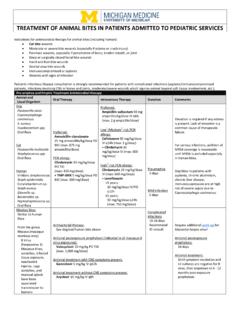Transcription of Intravenous Immune Globulin (IVIG) - Health Online
1 Intravenous Immune Globulin ( ivig ) Flebogamma, Gammagard, Gamunex, and others This handout explains treatment with Intravenous Immune Globulin ( ivig ). It includes how it is given, common and rare side effects, safety concerns, and other cautions. Patient Education Patient Care Services What is Immune Globulin ? Immune Globulin is a mixture of blood proteins that is made by the human Immune system. These proteins are called antibodies. Antibodies protect us from infection. Immune Globulin helps our bodies fight off infection and disease. It may also decrease inflammation. Immune Globulin can be removed from the blood and then used to treat medical conditions. How is Immune Globulin given? Immune Globulin is usually given through a needle in your vein that is connected to an Intravenous (IV) line. This is why it is called Intravenous Immune Globulin ( ivig ). You will receive your doses of ivig in the hospital. It may take many hours to receive a single dose.
2 What is ivig used for? ivig is used to treat a wide variety of conditions. Some of these are: Immune deficiency (when someone does not produce enough Immune Globulin ) Idiopathic thrombocytic purpura (a bleeding disorder) Chronic demyelinating polyneuropathy (a disease of the peripheral nervous system, the system of nerves that sends information to and from the brain and spinal cord) Prevention of graft vs. host disease (a condition that can occur after a bone marrow or stem cell transplant) Infection in people who have had stem cell transplants Page 2 Patient Care Services Intravenous Immune Globulin ( ivig ) Doses and Dosing Schedule Receiving your full dose of ivig can take anywhere from 2 hours to 1 to 2 days, depending on your dose. Ask your doctor or nurse ahead of time how long your infusion will last so that you know how to plan your time. There are different schedules for receiving ivig , Some people receive 1 dose once a month, or 1 dose for 2 or 3 days in a row every 4 to 6 weeks, or 1 dose every few weeks.
3 Ask your doctor or nurse how often you will be receiving ivig . Your dosing schedule will depend on: The medical condition you are receiving ivig for Your weight (make sure to tell your doctor if you gain or lose weight) How well your kidneys are functioning Other Health conditions you may have There may be shortages of ivig at times. During a drug shortage, you may not be able to receive your ivig at your regular time. To prevent any waste, ivig is prepared only after you arrive for your treatment. ivig needs to be prepared by the pharmacy and this takes time. Thank you for your patience. Are there any side effects? While you are receiving your dose of ivig , you may have some side effects. Some common side effects are: High blood pressure (Your nurse will monitor your blood pressure while you are receiving ivig .) Fever or chills Nausea or vomiting Muscle aches or pains Some of these side effects may go away if they are treated with certain medicines.
4 Talk with your nurse to see what kinds of medicines have been ordered with your ivig infusion. Tell your nurse right away if you have: - Wheezing - Chest tightness - A hard time breathing - Swelling in your face, lips, tongue, or throat Page 3 Patient Care Services Intravenous Immune Globulin ( ivig ) Other less common side effects of ivig include: Migraines Some people have bad headaches after receiving ivig . People who have had migraines in the past are more likely to get them from ivig treatment. Tell your doctor if you have had migraines before. Ask if you can take medicine to treat them. Aseptic Meningitis Aseptic meningitis is inflammation of the lining of the brain and spinal cord. This is a rare side effect of ivig . It feels like a severe headache. These headaches may occur several hours to 2 days after you receive your dose of ivig . Tell your doctor if you have any severe headaches after your dose of ivig . Kidney Problems ivig may cause your kidneys not to work as well as normal.
5 Tell your doctor if you have kidney disease now or have had kidney disease in the past. If you have, extra precautions may be taken, such as making sure you receive extra fluids through your IV before you receive ivig . Call your doctor right away if you cannot pass urine. Blood Clots Receiving ivig may increase the thickness (viscosity) of your blood. This may increase your chances of getting a blood clot. Tell your doctor if you have any pain or swelling in your arms or legs, or where the IV was. Call your doctor right away or go to the emergency room if you have: - Chest pain - Shortness of breath - Sudden weakness or numbness or tingling on one side of your body - Sudden vision changes Page 4 Patient Care Services Intravenous Immune Globulin ( ivig ) University of Washington Medical Center Clinician Review/Published: 02/2012 Reprints on Health Online : Questions? Your questions are important. Call your doctor or Health care provider if you have questions or concerns.
6 UWMC clinic staff are also available to help. _____ _____ _____ _____ Patient Care Services 1959 Pacific St. Seattle, WA 98195 Blood Complications Very rarely, receiving ivig may be linked with hemolysis (breakdown of red blood cells) and a decrease in the number of white blood cells. These side effects are not common. Tell your doctor if you have extreme fatigue (tiredness), dark urine, yellow skin color (jaundice), abdominal pain, shortness of breath, or rapid heart rate. How safe is ivig ? ivig is prepared from the blood of people who are volunteer blood donors. These volunteers are screened by filling out a detailed questionnaire and Health history before they donate blood. If they have any condition that could make the blood supply unsafe, they are not allowed to donate their blood. All blood products in the are tested for harmful bacteria and viruses. They are also processed so that any potential viruses are killed.
7 All blood products that are processed in the are believed not to contain harmful bacteria, viruses, and prions (proteins that cause infections). The dose of ivig you receive may require that you also receive a lot of IV fluid. Because of this, you may also receive diuretics. These medicines will remove excess fluid from your body. This will help prevent swelling or major changes in the amount of blood in your body. ivig may change how your body responds to vaccines. If you need a vaccine that uses a live virus, talk with your doctor first. Make sure that you get your vaccine before you receive ivig . Or, ask your doctor how long to wait after receiving ivig before getting the vaccine. A very small number of people do not have an Immune Globulin called immunoglobulin A (IgA). If you have this rare condition, talk with your doctor. You will need to receive a special type of ivig . How do I pay for my ivig treatment? ivig can be very expensive.
8 Some insurance companies do not pay for ivig at all. Some others may pay for ivig only if it is being used to treat certain conditions. Call your insurance company to find out if they will pay for your ivig treatment.
















